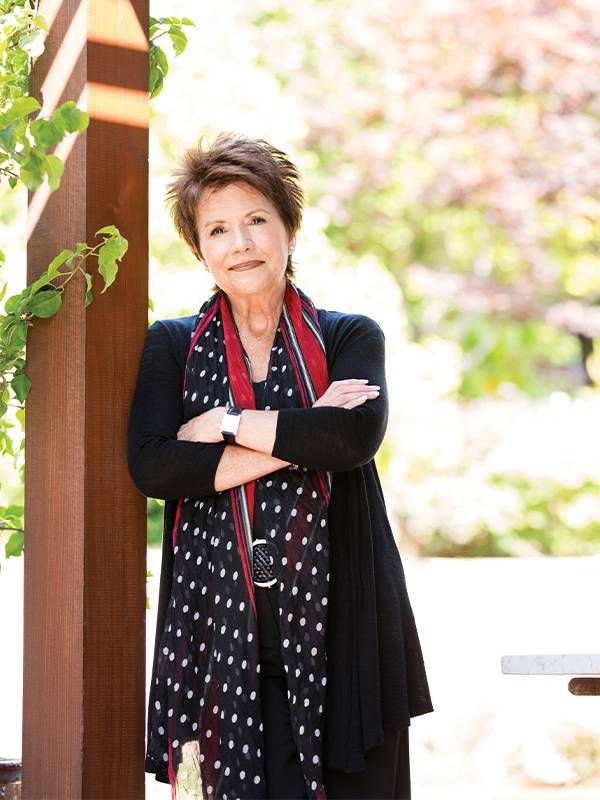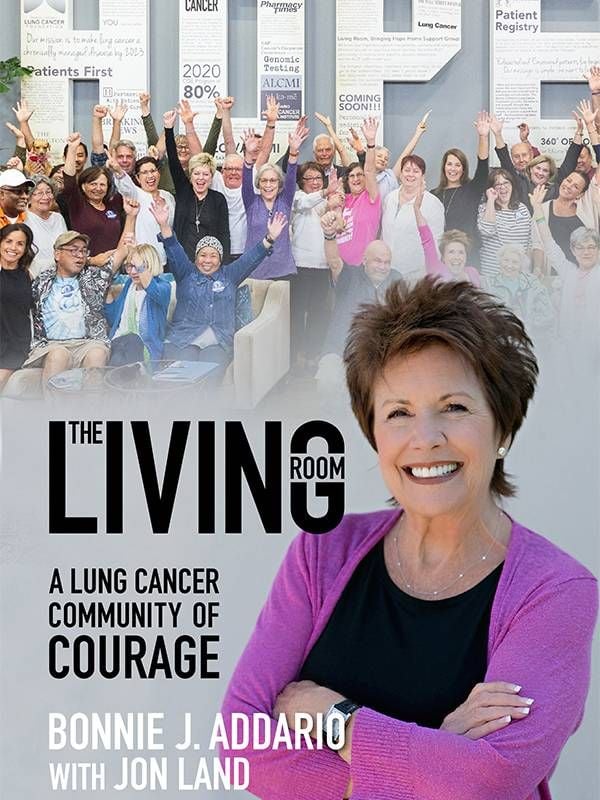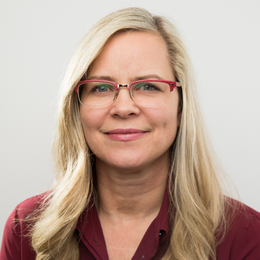This Survivor Wants to Change the Narrative Around Lung Cancer
‘The Living Room’ author aims to end lung cancer stigma by showcasing the wide range of people, including never-smokers, who get the disease
"Life feels over when you get any cancer diagnosis," writes Bonnie Addario, "but lung cancer is especially nefarious, given that people are as likely to shake their heads at you as shake your hand warmly and wish you good luck. After all, you brought it on yourself, right?"

Addario was 55 and president of a large, privately held oil company when she was diagnosed with advanced lung cancer in 2003. For someone used to being in control, the situation felt wildly out of her control. Adding to the uncertainty was the location of her tumor. It was invading her aorta making surgery extremely risky.
In her new book, "The Living Room: A Lung Cancer Community of Courage," Addario shares her treatment journey and the stories of 19 other lung cancer patients. Her message is one of hope.
"People are pretty blatant when they find out you have lung cancer. The first thing they ask you is if you smoke."
While lung cancer kills as many people as breast, prostate and colon cancer combined in the U.S. annually (over 130,000 deaths), treatments have improved recently thanks to targeted drug therapies that interrupt the growth of cancer cells while minimizing damage to healthy cells.
But stigma surrounding lung cancer persists and is a drag on research funding.
"People are basically of the belief that all lung cancer patients smoke and therefore they brought it on themselves and therefore we really don't need to do anything for them," says Addario, who is co-founder and chair of the GO₂ Foundation for Lung Cancer, which works to extend and improve the lives of lung cancer patients.
The support group she founded in 2006 after being declared cancer-free is the inspiration for her book's title. The "Living Room" refers to the group's deliberately relaxed meeting space in San Carlos, Calif., lined with plush sofas, coffee tables and carpets; a place devoted to living, not dying. (Support group meetings have been entirely virtual during the pandemic.)
Next Avenue spoke to Addario about her book and the ways her organization is trying to change the perception of lung cancer:

Next Avenue: You write that lung cancer patients are often blamed for their disease. How does that affect them?
Bonnie Addario: I'll tell you this short little story about this lady that I met early on who had lung cancer. I was talking to her one day and she said, 'Bonnie, I don't tell people that I have lung cancer. I tell them I have breast cancer.' And I said, 'Why do you do that?'
And she said, 'Because, I don't want to go through the questions. I don't want to go through the shame and the blame. I just want to take my meds and get through this. I never smoked a day in my life, but smoking is killing me.' By that she meant the stigma that all people with lung cancer smoke and that's why they get the disease.
Why do you suppose so many people assume that?
I think people are pretty blatant when they find out you have lung cancer. The first thing they ask you is if you smoke. And I don't blame anybody for doing things like that. I mean, it's happened with other diseases – mental health, it happened with AIDS, many, many other diseases.
[Fighting stigma] is not all we do at the Foundation, but it would still be huge and remarkable if we could put an end to this stigma. We could do so much more, so much quicker and we could save so many lives.
"When Richard Nixon declared war on cancer in 1971, lung cancer didn't get on that train. But lung cancer is on the train now."
There are other reasons why people get lung cancer besides smoking.
There are nine genomic mutations in lung cancer; if one of those nine mutations is known to be what's driving your cancer, that allows you to go on a targeted drug just for that mutation, which is huge. And lung cancer is actually leading the way in the discovery of the genomic mutations. We're starting to see that a lot of these genomic mutations are in other cancers as well.
But then there's other things like radon and just the toxic air we breathe. Anybody with lungs can get lung cancer.
Why did you feel it was important to share the personal stories of other people who have lung cancer?
They need attention and we need to help them. I also wanted the reader to see real people here, people that deserve to get the best possible care.
My whole goal was to let the general public see these are the faces and the people who get lung cancer. And I want people to go, 'Wow, I just didn't know. I just didn't know.'
Twenty percent of lung cancers are in these young people, and they're the complete antithesis of what somebody thinks lung cancer looks like. They're fit, they're mostly athletic and if they weren't a college athlete, they're a runner or a spinner.

What do you hope to achieve with the book and in drawing more attention to lung cancer?
I think the ultimate goal is a cure, and that's not going to be anytime soon for any cancer.
I think everyone would agree that right now what we're shooting for in lung cancer is chronically managed, keeping [patients] going until the next [new genetic] marker pops up and then we find out they have that [marker], so then there's a new drug there.
And similar to AIDS, you look at an AIDS patient [who] has this handful of multiple different drugs and every patient is unique, so everybody is going to have a very unique treatment for them based on what all their testing shows us.
I am now hopeful that the beginning [of a new wave of treatment options] has begun. It's starting to happen. [We have] more drugs in the last five years than the last five decades. That's huge.
When Richard Nixon declared war on cancer in 1971, lung cancer didn't get on that train. But lung cancer is on the train now.


